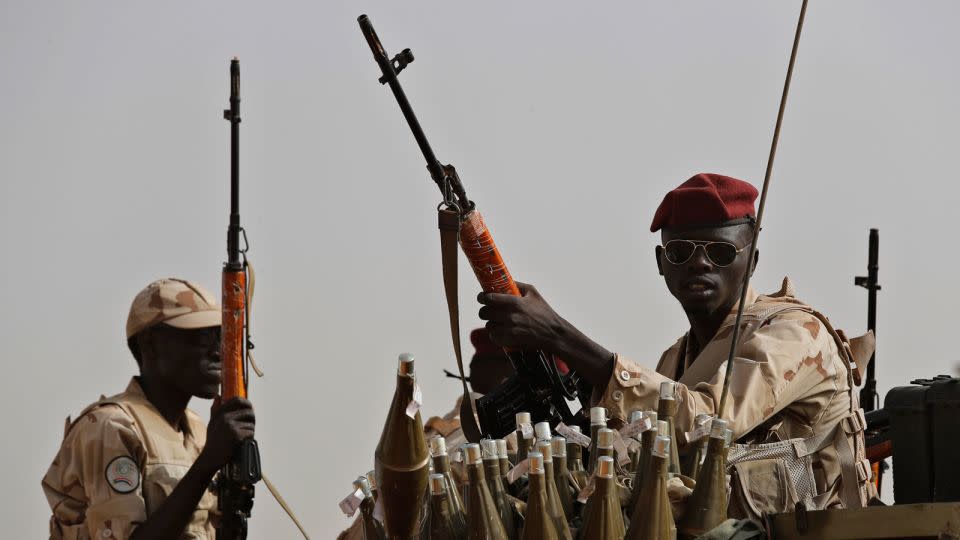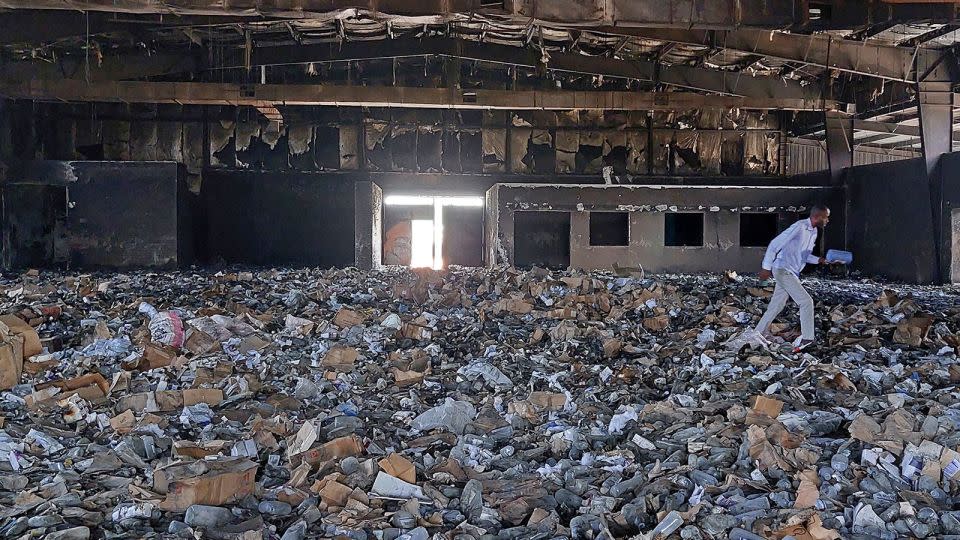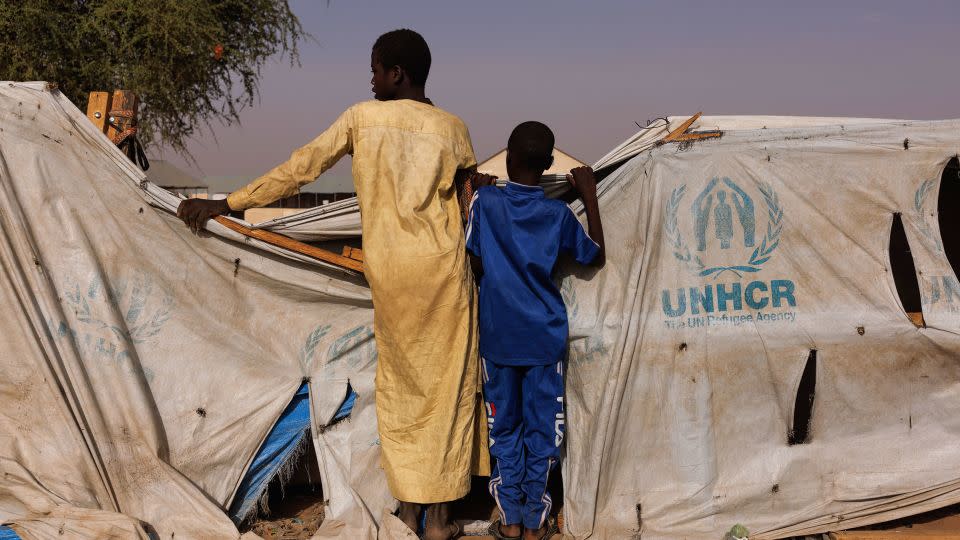Darfur may be on the brink of another genocide. Will the world act this time?
Darfur, a region in western Sudan, has a tragic history marked by ethnic violence and humanitarian crises. In the early 2000s, the area experienced a brutal conflict that resulted in the deaths of hundreds of thousands of people and displaced millions.
Today, there are alarming signs that Darfur may be heading towards another genocide.
For more than a year, swathes of Sudan have erupted in fierce clashes between the Sudanese Army and the paramilitary Rapid Support Forces (RSF) that have left more 14,000 people dead and displaced more than 8 million others, according to the United Nations.
But their battle for territorial control has now drifted toward El Fasher, the last major town in Darfur that’s yet to be conquered by the RSF.
Analysts say it’s only a matter of days before El Fasher falls to the rebels.
What’s happening in Darfur?
Ethnic-related killings have intensified in Darfur since fighting broke out in mid-April last year between the rival military factions. The RSF, which evolved from the Arab Janjaweed militia that spearheaded the genocide of the early 2000s, killing an estimated 300,000 people, has however, targeted the Masalit ethnic group and other non-Arab communities.
Reports indicate widespread atrocities, including mass killings, sexual violence, and the systematic destruction of villages. Human Rights Watch and other organizations have documented these abuses, which have been likened to ethnic cleansing campaigns.

The violence has forced tens of thousands of people to flee, many seeking refuge in neighboring Chad, the UN Refugee Agency said.
At least 134 people were killed in El Fasher last month after gunfire rang out in the city and bombs fell on civilian homes as RSF fighters encircled the town.
Last week, North Darfur’s main hospital in El Fasher was also forced to close after the RSF raided the facility and looted vital supplies. The hospital had previously been hit by bullets and mortar shells.
Indicators of genocide
The RSF is headed by Mohamed Hamdan Dagolo, also known as Hemedti, a former leader of the Janjaweed militia.
Analysts told CNN that the targeted nature of the violence in Darfur, the systematic approach of the RSF, and the historical context of ethnic conflicts in the region all suggest that the situation could evolve into another genocide.
The intent to destroy the Masalit people and other non-Arab groups mirrors the patterns of violence that characterized the genocide of the early 2000s, said Sudanese lawyer Mutasim Ali.
“The RSF uses systematic dehumanization method against non-Arabs in Darfur, saying, ‘these are dirt, dogs and monkeys’ and ‘let’s kill the babies and males because if they grow up, they will fight us back.’ There is a systematic policy of dehumanization .. the same explicit incitement from since the early 2000s,” said Ali, a legal adviser at the Raoul Wallenberg Centre for Human Rights.
In April, the United Nations Special Adviser on the Prevention of Genocide, Alice Wairimu Nderitu, warned that “prevailing signs of genocide” and “grave human rights violations and abuses continue to be reported against innocent civilian populations” in Sudan.
“Most of the atrocities that are committed today are by the same actors in the early 2000s. The RSF is rebranded Janjaweed militia: same commanders, same ethnic tribes, and the same victim groups (non-Arab communities) in Darfur that are being systematically targeted by the RSF,” Ali told CNN.
He added: “We see that the perpetrators are documenting their abuses by themselves. Back in the day, there were no cell phones, and (abuses) were primarily documented by human rights organizations that were in Sudan. But this time, they document killing people, burning villages, and their incitement.”

Weapons support from regional powers
Ali says that technology and sophisticated weaponry are the only peculiarities that differentiate the RSF’s current atrocities from the genocide committed by the Janjaweed more than two decades ago.
Where previously, they used camels, horses, and basic weapons. The militia now has armored vehicles, drones, and advanced weaponry, along with significant support from regional powers and nations such as the United Arab Emirates, Ali said.
A June 12 report by the Yale Humanitarian Research Lab said that a cargo plane believed to be owned by the UAE was identified through satellite imagery flying within RSF-controlled areas in El-Fasher on June 11.
“The same model of aircraft (IL-76) is reported to be used for lethal aid transfers by the UAE to the RSF for flights to locations in Chad,” the report added.
The UAE has denied providing military, financial, or logistical support to any armed group in Sudan.
What happens if El Fasher falls?
US Special Envoy for Sudan, Tom Perriello, said this week that El Fasher’s fall to the RSF could be imminent.
Home to nearly 2 million people, the city is predominantly occupied by non-Arab ethnic groups, including the Masalit.
El Fasher also shelters hundreds of thousands of displaced people who fled other parts of Darfur that were captured by the RSF, including El Geneina where hundreds of non-Arab people were massacred last year.
Ali told CNN similar atrocities were likely to happen in El Fasher if the city came under RSF control.
“El Fasher is going to be a lot more catastrophic because it is basically in the middle of a desert. Even if people decide to leave, probably they will die in the desert. We will see another genocide on our watch.”
What has been the international response?
The UN Security Council adopted a UK-led resolution Thursday demanding that the RSF ends its “siege” of El Fasher.
“The fighting must stop now,” said UK Foreign Secretary David Cameron in a post on X, adding that warring “parties must let in urgent humanitarian aid to prevent a famine.”
Earlier this week, the International Criminal Court said it was investigating allegations of war crimes in El Fasher while making a public call for evidence.
International response to the conflict has however been criticized as insufficient. Despite calls for action, including the deployment of protective missions and the imposition of sanctions by the United States on key RSF commanders, concrete measures have been limited.

“The international response does not come close to meeting the scale of the world’s largest man-made humanitarian disaster,” said international human rights lawyer, Yonah Diamond.
“The major powers have largely invested in a sham peace process for 14 months that is going nowhere and serves as a cover for daily mass atrocities on the ground. Only concrete acts of protection and accountability will stem the violence,” he told CNN.
International efforts to broker ceasefires between the Sudanese Armed Forces and the RSF have been unsuccessful.
Diamond said there has also been insufficient coverage of the Sudan war when compared to other global conflicts.
“Every major news outlet has dedicated an ongoing slot to Gaza and Ukraine, with ad hoc coverage for Sudan. There is no reason why a conflict impacting a greater number of civilians, threatening millions with death by starvation and an ongoing genocide do not receive the same attention,” he said.
He noted that this lack of attention hinders humanitarian efforts, pointing out that while Gaza and Ukraine have each received about 30% of their humanitarian response plans, Sudan, where 25 million people urgently need help, has received only about half of that amount.
What will happen next?
As Sudan steers dangerously towards another genocide, the world’s response in the coming months will be crucial in determining the outcome.
“The international community, led by the African Union, must deploy a civilian protection mechanism to protect the millions at risk in El Fasher and elsewhere in Sudan and explicitly threaten the UAE with consequences should it fail to restrain the RSF and continue to supply the militias with heavy weaponry,” Diamond advised.
“The US, the UK, and others have leverage to exert pressure on their ally, the UAE, to end the RSF’s genocidal campaign today. President (Joe) Biden can simply call on the UAE to halt its support for the RSF, which would fall apart without it.”
For more CNN news and newsletters create an account at CNN.com


